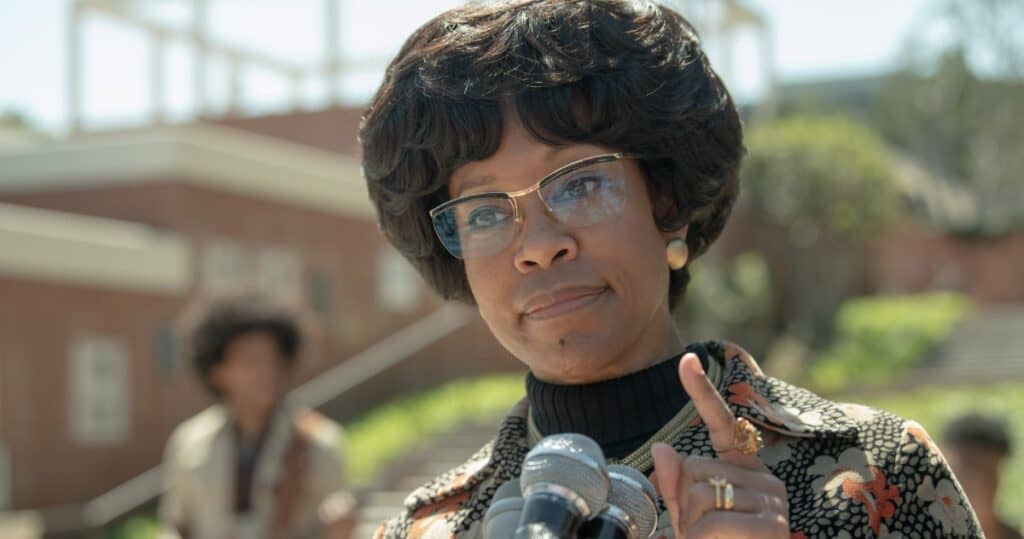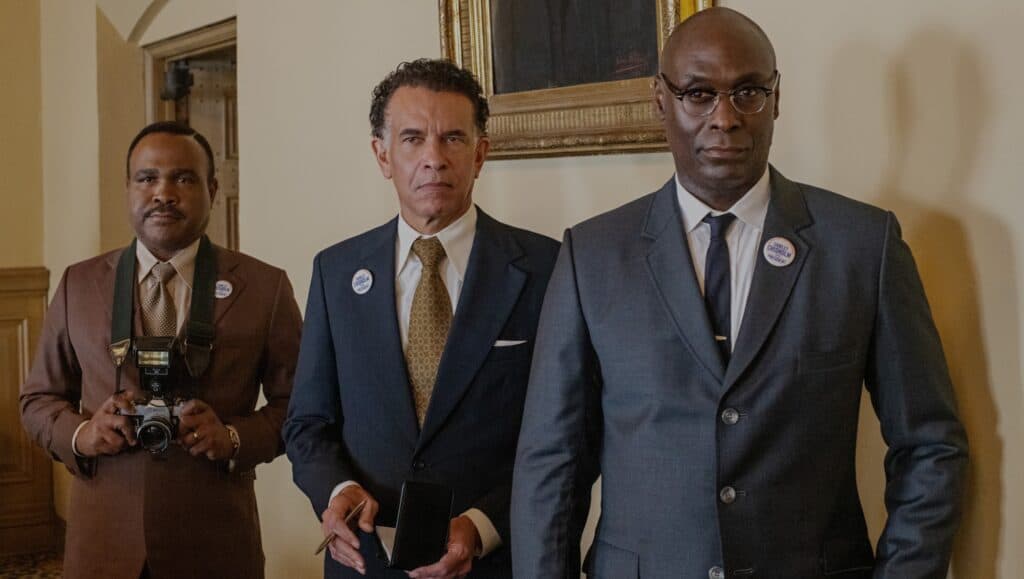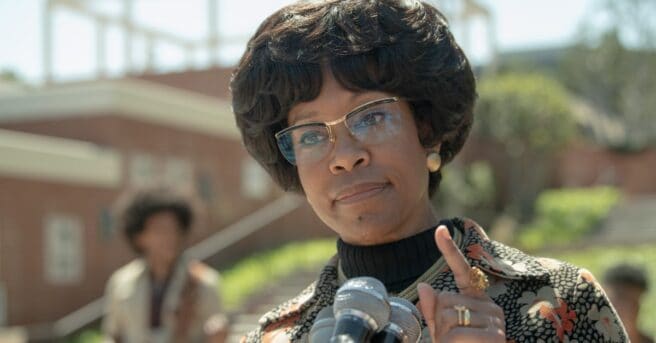

Plot: The story of the first Black congresswoman and political icon, Shirley Chisholm, and her trailblazing run for president of the U.S. It chronicles her audacious, boundary-breaking 1972 presidential campaign.
Review: 2024 is an election year in the United States, which means we are going to be inundated by countless robocalls and television ads as the country once again selects the Commander in Chief for the next four years. While it is as contentious as ever in this country, there have been volatile and unique elections in the past. Fifty-two years ago, an election took place that featured many firsts, but most notably, it was the year that Congresswoman Shirley Chisholm became the first black candidate for President of the United States. Her story has been chronicled in documentaries and was spoofed last year in Hulu’s History of the World Part II. Still, John Ridley’s feature film Shirley, starring Regina King in the title role, is the first motion picture to tell her story. A familiar underdog tale, Shirley is nonetheless an inspiring and aspirational story that hits the right notes in reminding us what positive political action can look like.
In 1972, newly elected Shirley Chisholm found herself an outspoken newcomer to Congress, where she was one of just five Black legislators and the only woman. With the support of allies like Ron Dellums (Dorian Missick), political organizer Mac Holder (Lance Reddick), and civic leader Arthur Hardwick Jr (Terrence Howard), Shirley makes the decision to run for the Democratic nomination for President. Pulling in young law student Robert Gottlieb (Lucas Hedges) to run her student outreach program, Shirley enlists campaign manager Stanley Townsend (Brian Stokes Mitchell) and begins a grassroots run for the top job in the United States. With the slogan “Unbought and Unbossed,” Shirley Chisholm was the definition of an underdog. A cursory glance at Wikipedia or any historical reference, and you will discover that not only did Chisholm not gain the nomination, but she finished a distant seventh in the overall primaries that year. So, why would that make for an interesting film? Because that is not the entire story.
Shirley is less invested in the success of the Chisholm campaign but rather the spark it ignited. 1972 was the first year that the voting age in the United States was lowered to 18 in light of a large number of younger adults being sent to Vietnam. Using the youth demographic as a base, we see that Shirley Chisholm engages voters without regard for race or age and instead as an alternative to major candidates like Hubert Humphries and George McGovern. Equally controversial was Alabama Governor George Wallace (W. Earl Brown), the noted candidate who stood against desegregation in schools. Focusing on Chisholm’s energy and vision makes Shirley less of a traditional campaign movie despite hitting all of the formulaic notes of the sub-genre. Writer/director John Ridley (12 Years A Slave) includes multiple montages showing the campaign’s momentum and splicing in actual news footage to supplement the era-appropriate costumes and set design. This works, for the most part, but the film fails to make much use of any of the cast outside of Regina King.

Regina King, a talented actress and filmmaker in her own right, impersonates Shirley Chisholm’s mild Caribbean accent, which flares up when she is angry. Along with a mole on her chin and a strip of black on her front tooth to mimic Chisholm’s signature dental gap, King replicates Shirley’s boundless enthusiasm even when those around her are losing hope. This includes a meeting with conniving politicians like Walter Fauntroy (Andre Holland) and Black Panther leader Huey Newton (Brad James). Regina King also gets the opportunity to act opposite her sister and fellow producer, Reina King, who portrays Shirley’s sister, Muriel St. Hill. Of the main cast, the late Lance Reddick gets the most screen time, along with Michael Cherri as Shirley’s husband, Conrad. Most other cast members are relegated to minimal roles, especially Terrence Howard, who barely registers as Shirley’s confidant and future second husband. Everyone in the cast is good, but they all seem to exist to support Regina King’s showcase of a performance, which is solid but not quite as strong as it could have been.
John Ridley has successfully adapted true stories of Black Americans from various eras of history. While 12 Years A Slave was his most searing screenplay to date, Shirley hews closer to Ridley’s Red Tails, which told an under-adapted chapter of history in a cinematic context. As a director, Ridley has not been quite as effective with his two prior directorial efforts, 1997’s Cold Around The Heart and 2021’s Needle in a Timestack, lacking the panache of a more skilled filmmaker. With Shirley, John Ridley starts out using an approach that mimicked the film and video quality of the 1970s before segueing into a traditional-looking production. Aside from some blatant green-screen moments in the early Washington DC scenes, most of Shirley is serviceably directed, with most of the scenes in smaller, intimate interiors. With a heavy dose of era-appropriate music, Shirley looks right out of the era it portrays. Clocking in just under two hours, Shirley‘s closing act is its strongest, with the final shots showing the legacy of the characters in the film, delivering the conclusive message as to why Chisholm’s story is so important to tell.
Shirley is a good story told within an average film. John Ridley’s script hits all of the right notes for an underdog political story, but it does not muster the same enthusiasm as the real Chisholm did during her run for the Presidential nomination. Regina King does her best to impersonate Shirley Chisholm but cannot carry the entire movie alone. John Ridley is a far better writer than he is a director and the limits of his prowess as a helmer show. Shirley is an important story that could have been better and more focused. I appreciate what this movie is trying to be, but it never builds the same momentum as the participants in the actual event. Maybe if Regina King had directed Shirley, there would have been something more vital than what Ridley could produce.
Shirley has been given a limited theatrical release and will be streaming on Netflix as of March 22nd.
The post Shirley Review appeared first on JoBlo.

Leave a Reply